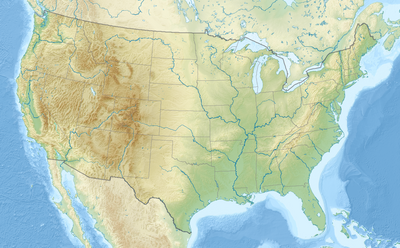The Wildlands Conservancy
| Abbreviation | TWC |
|---|---|
| Formation | 1995 |
| Type | 501(c)(3) non-profit |
| Legal status | Nonprofit organization |
| Purpose | Environmental conservation |
| Headquarters | Oak Glen, San Bernardino County, California |
Region | California, Oregon, Utah |
| Methods | Buy land and open to public |
Staff (2022) | 91[1] |
Volunteers (2022) | 900[1] |
| Website | www |
The Wildlands Conservancy is a nonprofit organization with a mission to preserve land for public recreation. It manages 25 preserves, detailed in the list of its preserves, covering over 200,000 acres (81,000 ha) across the western United States. The preserve system encompasses diverse landscapes including mountains, valleys, deserts, rivers, and oceanfront lands. The Wildlands Conservancy buys and restores land, builds public visitor facilities, and provides outdoor education programs for children. All usage (hiking, camping, education programs) is free of charge, attracting over 1.5 million visitors annually.[2][3]
History
[edit]The California Desert Protection Act of 1994 established two national parks, one national preserve, and 69 wilderness areas. However, private inholdings persisted within these newly designated public lands. From 1999 to 2004, The Wildlands Conservancy undertook an extensive effort to acquire 646,000 acres of private inholdings situated within the California desert. These lands were subsequently transferred to various government agencies to be preserved.[4]
From 1995 to 2000, the organization established a set of preserves in Southern California, including the San Bernardino Mountains and desert canyons. The conservancy acquired a historic trout hatchery and rehabilitated the area in 2005, resulting in the creation of the Whitewater Preserve, which provided access to the San Gorgonio Wilderness.[2]
Starting in 2005, The Wildlands Conservancy expanded its efforts into Northern California, preserving land along the Eel River and the Sonoma Coast.[2][5][6]
President Obama designated three national monuments in 2016: Sand to Snow National Monument, Mojave Trails National Monument, and Castle Mountains National Monument. The Sand to Snow National Monument encompassed the Whitewater Preserve and Mission Creek Preserve, and substantial land previously acquired and transferred by the conservancy contributed to the Mojave Trails National Monument.[7][8][9]
Between 2015 and 2021, The Wildlands Conservancy continued its conservation efforts by establishing various preserves across California, including within the eastern Sierra Nevada region.[2]
In 2022, the organization expanded its initiatives beyond California's borders, venturing into Oregon for the first time.[10] In 2023, it further extended its mission to Utah through the acquisition of land at the boundary of Bears Ears National Monument.[11]
Regions
[edit]The preserves are located in various regions.
Coast
[edit]-
Jenner Headlands
-
Estero Americano Coast
Desert
[edit]North America has multiple deserts and the conservancy has preserves in many of them.
- Columbia Plateau: Enchanted Rocks Preserve
- Colorado Plateau: Speaking Springs Preserve
- Great Basin Desert: West Walker River Preserve, Two Rivers Preserve
- Mojave Desert: Pioneertown Mountains Preserve
- Sonoran Desert and Mojave Desert ecotone: Mission Creek Preserve, Whitewater Preserve
Works
[edit]- Jack Thompson (The Wildlands Conservancy) (April 19, 2016). Inside the California Desert's Newest National Monuments (Video). Rancho Mirage Library & Observatory.
- "Carmel Valley's Newest Preserve and Kern County's Tule Elk". OpenRoad. Episode 92. April 7, 2024. NBC Bay Area. Retrieved May 5, 2024. OpenRoad had editorial control. The Wildlands Conservancy funded the episode.
- The Wildlands Conservancy (December 28, 2012). Behold the Beauty (1st ed.). The Wildlands Conservancy. ISBN 978-0988819702.
- The Wildlands Conservancy (2021). Behold the Beauty (2nd ed.). The Wildlands Conservancy.
See also
[edit]- List of The Wildlands Conservancy preserves
- List of ecoregions in the United States (WWF)
- List of North American deserts
References
[edit]- ^ a b IRS form 990 for 2022
- ^ a b c d "The Wildlands Conservancy". The Wildlands Conservancy. Retrieved August 15, 2023.
- ^ "Carmel Valley's Newest Preserve and Kern County's Tule Elk". OpenRoad. Episode 92. April 7, 2024. NBC Bay Area. Retrieved May 5, 2024.
- ^ "California Desert Land Acquisition » The Wildlands Conservancy". The Wildlands Conservancy. Retrieved August 15, 2023.
- ^ "Eel River Emerald Necklace". Retrieved August 15, 2023.
- ^ Kay, Jane (December 4, 2008). "5,630-acre Jenner Highlands saved for public". SFGATE.
- ^ "Feinstein introduces desert preservation act". The Sun. February 9, 2015. Retrieved June 8, 2015.
- ^ Murphy, Bernadette (September 1, 2016). "Monumental Achievement: One of the West's great natural wonders — the Sand to Snow National Monument — has finallly been given the recognition and protection it deserves …and it's in the Coachella Valley's backyard". Palm Springs Life.
- ^ Thompson, Jack (April 19, 2016). Inside the California Desert's newest National Monuments (Video). United States: Rancho Mirage Library & Observatory.
- ^ Plaven, George (April 21, 2022). "Conservancy purchases Oregon ranch, plans 'climate preserve'". Capital Press.
- ^ Bree, Jenna (July 25, 2023). "Conservation nonprofit acquires 320-acre piece of private property in Bears Ears National Monument". Fox 13 Utah.
Further reading
[edit]- Ritter, Matt (2018). California Plants: A Guide to Our Iconic Flora. San Luis Obispo, California: Pacific Street Publishing. ISBN 978-0-9998960-0-6.



